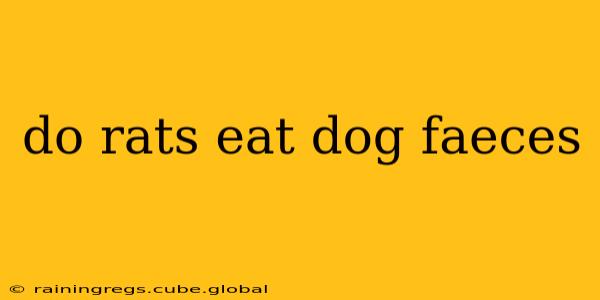Rats, notorious for their scavenging habits, have a surprisingly diverse diet. While they primarily seek out grains, seeds, and other readily available food sources, the question of whether they consume dog faeces is a common one. The short answer is: yes, rats will eat dog faeces, and other types of faeces, under certain circumstances. However, it's not a primary food source and several factors influence this behavior. Let's explore this in detail.
Why Would Rats Eat Dog Poop?
This practice, known as coprophagy, isn't unique to rats; many animals engage in it for various reasons. For rats, consuming faeces can be driven by several factors:
-
Nutritional Deficiency: If a rat's diet lacks essential nutrients, they might resort to eating faeces to supplement their intake. Dog faeces, while not ideal, might contain trace amounts of vitamins or minerals absent in their primary food source.
-
Gut Microbiota: Faeces contain beneficial gut bacteria. Consuming faeces can help replenish the gut microbiome, aiding in digestion and overall health. This is particularly important for young rats.
-
Opportunistic Feeding: Rats are highly opportunistic feeders. In environments lacking readily available food, they will consume virtually anything, including dog faeces, to survive. This is especially true in overcrowded or resource-scarce environments.
-
Habit: In some cases, coprophagy can become a learned behavior. If a young rat observes its parents or littermates consuming faeces, it might adopt the same habit.
What Are the Risks of Rats Eating Dog Faeces?
While rats might obtain some nutritional benefits from consuming faeces, there are significant risks involved:
-
Parasites and Diseases: Dog faeces can harbor various parasites and pathogens, including worms, bacteria, and viruses. These can cause serious illness or even death in rats.
-
Toxins: Depending on the dog's diet and health, its faeces might contain toxins or medications that could be harmful to rats.
-
Contamination: Dog faeces can be contaminated with other harmful substances from the environment, like pesticides or heavy metals.
What Should You Do If You See Rats Eating Dog Faeces?
If you observe rats consuming dog faeces, it's crucial to address the underlying issue: the lack of available food sources. Ensure that rats don't have easy access to food scraps or garbage. Implementing proper sanitation and waste management practices is paramount in deterring rodents from your property. Consult a pest control professional for advice on effective and humane rodent control strategies.
Are there other things rats eat besides dog faeces?
Yes, rats are omnivores with a highly adaptable diet. Besides dog feces, they also consume a wide variety of things including:
- Garbage: Food scraps, rotting vegetables, and other discarded food items.
- Seeds: Various types of seeds, including grains, nuts, and weed seeds.
- Fruits: Ripe and decaying fruits.
- Insects: Rats will also prey on insects and other invertebrates.
- Other animal waste: While dog feces is an example, they may also consume feces from other animals depending on circumstances.
How can I prevent rats from eating dog faeces?
The best way to prevent rats from eating dog faeces is to eliminate the attractants that draw them to your property. This involves proper sanitation and waste management practices:
-
Clean up after your dog promptly and regularly. This significantly reduces the amount of dog faeces available to rats.
-
Store garbage securely in sealed containers. Rats are adept at getting into even slightly damaged containers.
-
Seal cracks and holes in your home. This prevents rats from entering your house in search of food.
-
Maintain a clean yard. This makes your property less attractive to rodents.
By addressing these factors, you can greatly reduce the likelihood of rats seeking out food sources like dog faeces on your property.
Is it harmful for my dog if rats eat their feces?
While it's not directly harmful to your dog if rats eat their feces, it does create unsanitary conditions, especially if rats are breeding in your house. Rat infestations can spread disease, which may pose a health risk to your dog and your family.
By addressing the issues mentioned above, you'll create an environment that's less appealing to rats, leading to improved hygiene and better health for both your pets and your family. Remember, preventing rodent access to food is the most effective method of controlling their populations.
